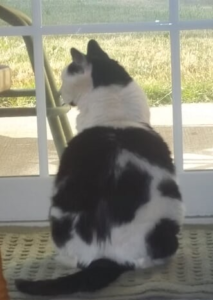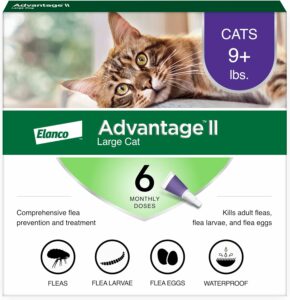It’s true that indoor cats live longer than outdoor cats, but that doesn’t mean they can skip their annual wellness visit to the vet. Indoor cats are just as prone to developing illness as outdoor cats, and catching diseases early makes treatment easier on you, your cat…and your wallet! Let’s talk about indoor cat health and what veterinary care they need.
👉 Want a healthier, longer life for your cat? See why I recommend The Complete Cat Care Guide
In this post, we’ll cover:
-
-
- Do Indoor Cats Need Vaccinations?
- How Often to Take Your Cat to the Vet
- Senior Cat Health Questions
- Monitoring Your Cat’s Weight
- Early Detection of Cat Health Problems
- Protecting Cats from Fleas, Ticks and Heartworm
- Cat Health Insurance
- The Complete Cat Health Care Guide
-
Watch My Video: Do Indoor Cats Need Vaccinations?
This post contains affiliate links. If you make a purchase, I’ll earn a commission (at no extra cost to you). As an Amazon Associate, I earn from qualifying purchases. I donate 10% of my profits to animal charities.
Do Indoor Cats Need Vaccinations?
Many owners of indoor cats ask, “Why should I vaccinate my pet for a disease that she’ll never be exposed to?”
It’s true that vaccinations help protect cats from many bacterial and viral conditions they’ll only catch from other cats, but if your unprotected cat slips outdoors, she’s got no help fighting communicable illness.
In my opinion, it’s a judgment call. But if you’re not willing to get all the “usual” shots for your indoor cat, please at least get the rabies vaccine. In some states this is required.
There are several documented cases of infected animals making their way into residences and, for an indoor cat, a bat can make a tempting squeaky toy! If your indoor cat catches a mouse, or if a bird gets into the house, and that animal is infected with rabies – the result could be fatal for your cat.
It’s just not worth risking – get them their rabies shot! For more information about the need for a rabies shot for indoor cats, click here.
For more information about what vaccinations your cat needs, read my post, Do Indoor Cats Need Shots? (includes video).
How Often to Take Your Cat to the Vet
It’s important that your indoor cat visit the vet once a year. The physical exam covers several important things like monitoring your cat’s weight, checking her blood pressure, heart rate, temperature.
The vet will look at your cat’s mouth and teeth, look inside her ears. These are all ways that any developing illness or condition may be detected early – which may prevent serious illness in the future.
Senior Cat Health Questions
Once you cat reaches 9 or 10 years old, they are considered a senior cat. Senior cats should see the vet twice per year. For more help caring for a senior cat, read my post, How to Help an Aging Cat (includes video).
In that post, we talk about what symptoms to look for that may let you know your cat is having difficulties and a bunch of ways you can really help an older cat be more comfortable, save and happy!
Watch My Video: How to Help an Aging Cat
Monitoring Your Cat’s Weight
Early Detection Can Save Your Cat’s Life
As cats get older, they can start to show signs of typical diseases associated with age. A simple blood test can check for chronic kidney disease, overactive thyroid and diabetes, which commonly affect older cats.
Establishing a baseline and keeping an eye on these markers can allow for early detection and easier treatment.
My vet discovered kidney disease early on in my then-10-year-old cat, changed her food to one specifically formulated for that particular condition, and literally saved my cat’s life.
Protecting Cats from Fleas, Ticks and Heartworm
 Consider Cat Health Insurance
Consider Cat Health Insurance
Complete Cat Health Care Guide
For more help with cat health care regardless of how old your cat is, I can recommend a fantastic guide called, The Complete Cat Health Care Guide.
This guide covers all aspects of caring for your cat. You can read my full review here, or purchase the guide here.













Thanks for this article. It certainly made me think about all the aspects of rearing an indoor cat. Personally I do believe that cats are domesticated wild cats and they need to go outside to live a fulfilled life, hunt and socialise. However, I guess there are circumstances which would make indoor rearing the most practicable solution. And many of the points you make relate to outdoor as well as indoor cats.
I’ve struggled with this for years. I’ve owned many cats and they’ve all been indoor cats. I often wondered if I was robbing them somehow by not letting them out – but for the most part, they seemed content to sit in the windows. Two were absolutely terrified of outside and wanted nothing to do with it. It’s everyone’s own preference/feeling, I guess. Thanks so much for the comment. I’m glad you found the article useful.
Hi loved the article. I was surprised to know that heart worms can be fatal to cats in some instances. I had not heard this before and only heard of parasites and leukemia that hurts/kills them and of course rabies. So is once a year okay for outdoor cats to see a vet or should i do it more often? Is it true that dry food causes kidney failure if they eat it exclusively?
PS. There is a topical medicine (Revolution)that prevents the heart worm larvae, mites, fleas and intestinal parasite.
I always took my cats once a year to the vet. Unless your vet wants to see them more often, I would think once a year is ok. It’s absolutely better for cats to eat a moist diet instead of dry food. Here’s an article that explains it in detail: Best Food for Your Cat. Thank you for your comments!
Cats are living beings like us humans so it only makes sense for them to have diseases similar to ours. It seems like kidney failure is pretty common among house pets. This is more common the older the pet is. It’s weird how it’s so common. As for diabetes, I know a friend who’s cat has that and passed away. It’s pretty sad considering how he had his cat for nine years straight. Anyway, great information.
I was wondering if a can has to have shot an a cooler an tags to be owned or be fined a ticket
I’m not sure if there are any states or countries where you’d be fined if your cat didn’t have vaccinations. I believe there would be rules by airlines and at country borders if you’re travelling with a cat, though. I’m sorry I can’t offer more help for your question. Debra